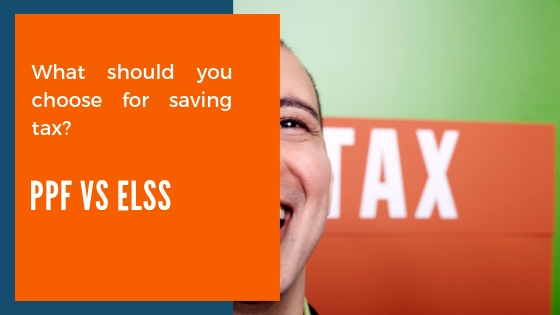


ELSS vs PPF: Which Tax Saving Instrument Is Better
“...but in this world nothing can be said to be certain, except death and taxes.”
Benjamin Franklin
While we can’t get clever with death, we can be smart with taxes and save our hard earned money. One can save tax by investing in various instruments such as Equity Linked Savings Scheme (ELSS), Public Provident Fund(PPF) and National Pension System(NPS) and tax saving fixed deposit etc.
Out of these tax saving options, ELSS and PPF are the most popular. Investment of up to Rs.1.5 lakh in a financial year in these two options among others qualify for tax deductions under Section 80C of Income Tax Act 1961.
Have you invested in PPF or ELSS? In this article, we will compare these two tax saving instruments which will help you to figure out the right one for you.
Lock-in Period:Both ELSS and PPF come with a lock-in period. ELSS funds have a lock-in period of three years while PPF comes with a 15-year lock-in period. However, in PPF, you can make partial withdrawals after the seventh year. Hence, we see that ELSS has a shorter lock-in period than PPF. This means that you can redeem the ELSS fund’s units after three years. However, it is suggested that you do not redeem it, as by being invested your capital will appreciate over time.
Returns:The returns is one of the key factors that distinguishes PPF and ELSS. The government of India fixes the interest rate of PPF every quarter. On the other hand, the returns in ELSS is not assured and is linked to the equity market. If we see the historical performance of both the two options, ELSS funds, in the last ten years has given returns of 13.55%* while the interest rates in PPF has ranged from 7.6% to 8.8%.
According to research by Value Research, an investment of Rs.1.5 lakh every year over the last 20 years, have grown to Rs.79.39 lakh in PPF. While in the same time frame, investment in ELSS has increased to 2.28 crore. Hence, in terms of returns, ELSS has outperformed PPF.
Investment amount:In case of PPF, you can only invest up to Rs.1.5 lakh in a financial year. However, there is no such restriction in the case of ELSS. While the tax benefit will apply to Rs.1.5 lakh, you can invest more and earn returns on the entire investment amount. As a result, ELSS is also a popular option to plan for long term goals.
Taxation: Gains fromELSS funds are taxed as per the equity funds and is subject to short term and long term capital gains. Short term capital gains are applicable if the units are sold before the 1st year. In this scenario, a tax of 15% will be applicable. If the units are held for more than a year, gains up to Rs.1 lakh in a financial year is exempted. If the gains are higher than Rs.10 lakh, long term capital gains will be applied in ELSS funds.
On the other hand, PPF falls under the EEE(Exempt, Exempt, Exempt) category. This means that the interest earned by investing in PPF and the principal amount is exempted from taxation.
Conclusion
By now, you may have become familiar with the differences between PPF and ELSS. PPF is the darling of Indian masses, but its long term performance is not attractive while ELSS funds have given attractive returns. Also, with the interest rate trending down from 8% to 7.9% (July-Sep 2019), it is unlikely that PPF will give a better return.
ELSS is not only a tax saving instrument; it can also help you to achieve your long term financial goals such as retirement. It is because you can invest over and above the Rs.1.5 lakh mark and still earn returns on the entire corpus.
If you have just started working or have no exposure in the equity market, you can invest in ELSS funds. Once you are comfortable with ELSS funds, you can start investing in other equity funds to achieve your financial goals.
In case of any queries, please get in touch with a financial advisor. He or she will be able to help you out with the best ELSS funds.
*Data as on 10th July, 2019
It is a wonderful journey of the last 18 Years of meeting people, understanding needs & tries to give appropriate solutions. It is the most satisfying profession for me & my team as we get a chance to be part of someone’s dream & goal achieving.
304,Maruti Sankalp, Opp.APC,
Anand Vidyanagar Road,
Anand-388001
+91 6353314707
AMFI Registered Mutual Fund Distributor | ARN-255332 | Date of initial Registration: 18-October-2022 | Current validity of ARN-255332: 17-October-2025.
Copyright © Shrey Wealth. All rights reserved.
Risk Factors – Investments in Mutual Funds are subject to Market Risks. Read all scheme related documents carefully before investing. Mutual Fund Schemes do not assure or guarantee any returns. Past performances of any Mutual Fund Scheme may or may not be sustained in future. There is no guarantee that the investment objective of any suggested scheme shall be achieved. All existing and prospective investors are advised to check and evaluate the Exit loads and other cost structure (TER) applicable at the time of making the investment before finalizing on any investment decision for Mutual Funds schemes. We deal in Regular Plans only for Mutual Fund Schemes and earn a Trailing Commission on client investments. Disclosure For Commission earnings is made to clients at the time of investments. Option of Direct Plan for every Mutual Fund Scheme is available to investors offering advantage of lower expense ratio. We are not entitled to earn any commission on Direct plans. Hence we do not deal in Direct Plans.